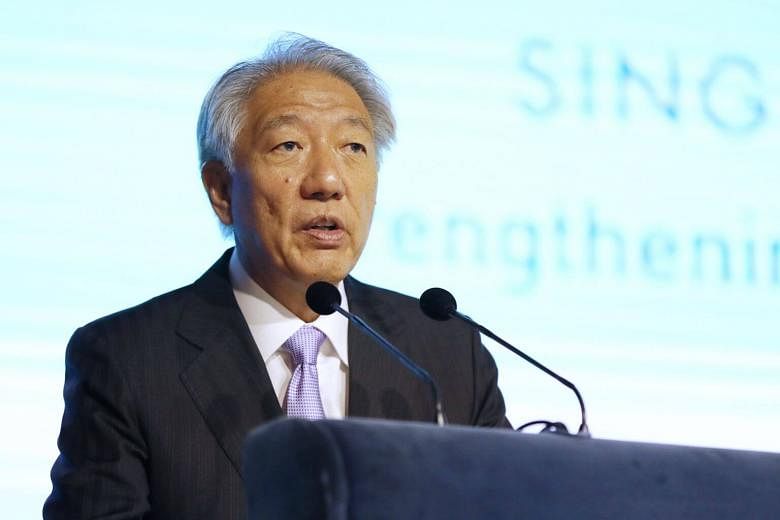SINGAPORE - Harnessing Asia's collective expertise and collaborations between private players, governments and multilateral banks would allow the region to overcome development hurdles and meet its significant infrastructure needs.
This would be key to Asia's success, and Singapore is able to provide a platform for Asia's infrastructure development and help unlock the region's potential, said Senior Minister Teo Chee Hean on Thursday (Aug 15).
In his keynote address at the fifth Singapore Regional Business Forum (SRBF), he outlined three key areas in which the Republic can contribute to Asia's development.
First, Singapore can help to create an inclusive environment to facilitate infrastructure projects in the region, bringing together interested parties with the right expertise to facilitate projects across the timeline, he said.
"Singapore is already a significant source of funds and expertise for infrastructure projects in the region," he said, citing that Singapore-based banks have provided loans or advisory services for an estimated 60 per cent of infrastructure projects in South-east Asia.
The presence of many multilateral development banks and international organisations here, such as the International Monetary Fund and the Asia-Pacific Economic Cooperation, also contributes to the vibrancy of Singapore's infrastructure ecosystem, he noted.
Second, Singapore's understanding of the region and its strengths as a financial centre and legal hub can help it provide new and innovative infrastructure solutions for Asia, said Mr Teo, who is also Coordinating Minister for National Security.
Singapore also has the expertise across its ecosystem to undertake feasibility studies and make infrastructure projects more bankable and investible, helping to "structure the financing for infrastructure projects across their entire life cycle", he added.
Furthermore, Singapore's ability to provide a range of reliable, cost-effective and timely dispute resolution modalities also gives international partners greater confidence and ease of mind when investing in Asia, he said.
Third, he emphasised the need for infrastructure decisions to be "resource-efficient and resilient to the effects of climate change", especially given Asian countries' vulnerability to the effects of severe weather.
He pointed out that Singapore is among the 20 best countries, out of 142, in terms of greenhouse gas emissions per dollar of gross domestic product.
"But we are still learning and improving, and working hard to reduce our overall carbon footprint," he said.
In addition, Singapore has been hosting the World Cities Summit biennially, providing a platform for city leaders, industry experts and academics to explore how urban planning innovations can make cities more liveable and sustainable, he said. A total of 128 cities participated in last year's summit.
Asian Infrastructure Investment Bank president Jin Liqun in his keynote speech at the forum held at The Ritz-Carlton, Millenia Singapore, spoke about the importance of sustainable development.
"Operations in infrastructure must improve and evolve," he said, noting that a greener approach needs to be adopted to building infrastructure in order to provide opportunities for sustainable infrastructure investment.
Mr Jin also highlighted that Singapore has become a regional hub for infrastructure talent, expertise and innovation, with the resources and specialisations to conceptualise and execute projects efficiently and effectively.
In his welcome address, Singapore Business Federation (SBF) chairman Teo Siong Seng also emphasised that regional collaboration is key to Asia's continued competitiveness and resilience, especially given the complex and uncertain global climate.
"Strengthening business collaboration for regional connectivity has to be grounded in mutual cooperation, respect, shared values, and most importantly, a common vision and goal," he said.
"As the region works towards enhancing its linkages, both physical and digital, I hope that we can all set our sights further and expand connectivity beyond Asean to other regions around the world."
More than 600 business leaders, diplomats and senior government officials from more than 50 countries were in attendance at this year's SRBF, which is SBF's flagship event.
Four memoranda of understanding (MOUs) were signed at the one-day forum, strengthening third-party market collaborations in the region.
The SBF and the China Harbour Engineering Company inked an MOU to identity third-party market projects for potential collaboration with Singapore companies under the Belt and Road Initiative. These projects will include public-private partnership projects in infrastructure and urban development.
Singapore's apex business chamber also signed an MOU with Chinese developers MCC Singapore and Union Development Group to strengthen cooperation on the sustainable development of Cambodia-China Comprehensive Investment and Development Zone and the Dara Sakor Seashore Resort project in Cambodia.
A third MOU was signed between shipping line Pacific International Lines and the Asean Federation of Forwarders Associations to strengthen multilateral trade in shipping and logistics between China and Asean in support of the New International Land-Sea Trade Corridor.
The last MOU, signed by Pacific International Lines subsidiary PIL Logistics and China's Hodo Group, will see the two firms engage in the areas of logistics business parks as well as international logistics and supply chain, strengthening the link between China and Asean companies.


